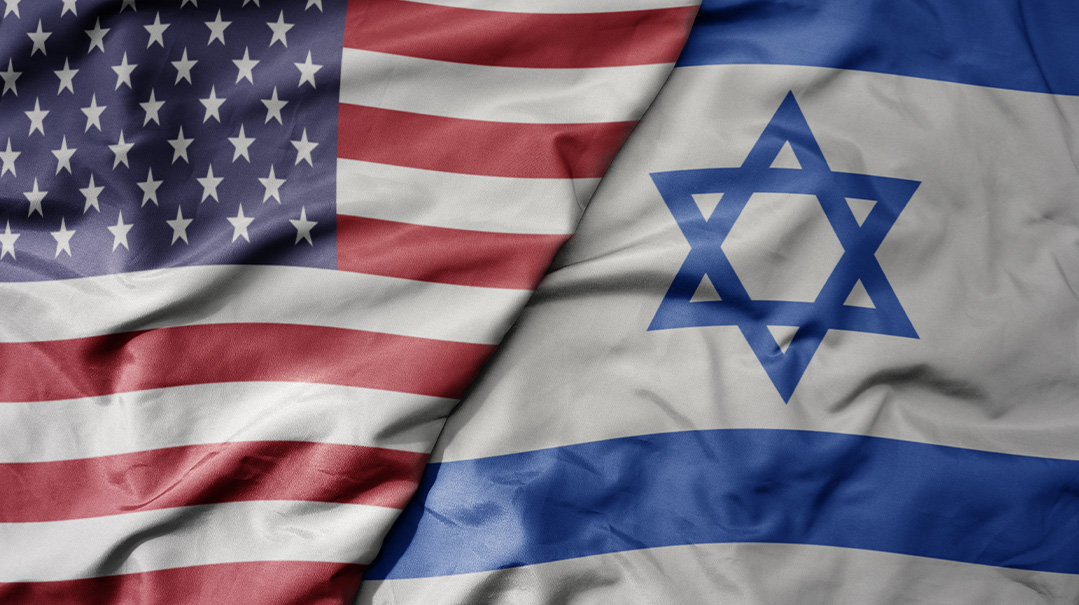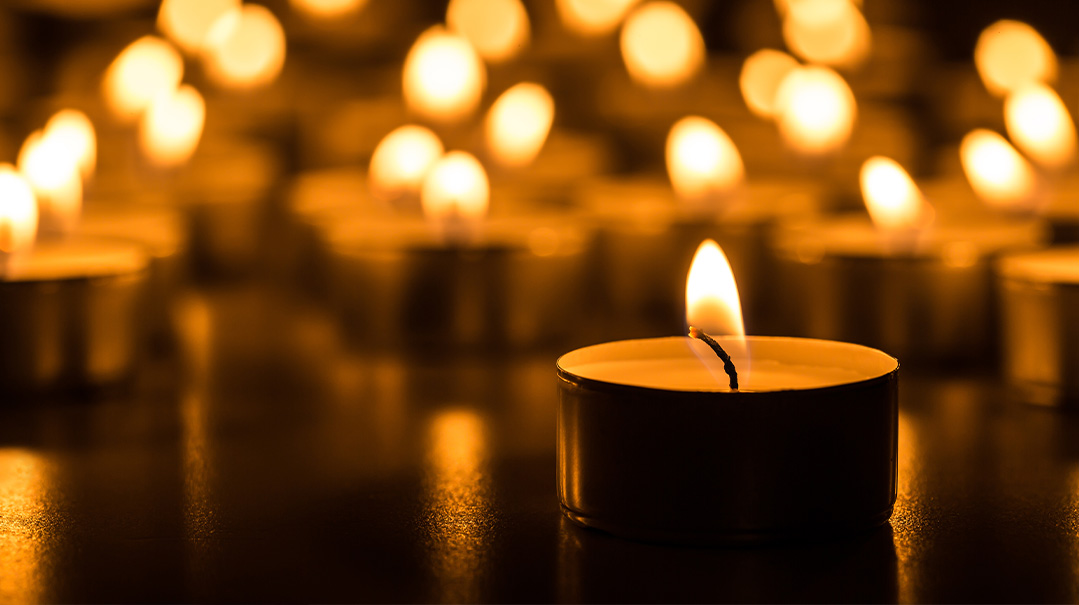Some Thoughts on Awakening to a Nightmare

Hamas’s goal is not a Palestinian state; its goal is to kill Jews in the most terrifying fashion
E
veryone has at some point awakened from a horrible nightmare, only to experience a rush of relief that it was only a bad dream. Since October 7, anyone living in Israel has experienced a nightmare from which there is no awakening. Even the most mundane daily tasks become almost surreal: How can I be brushing my teeth this morning, as on any other day, when yesterday I learned about forty babies and young children killed, many of them decapitated?
I’VE BEEN thinking a lot lately about something my father a”h used to say after making aliyah: “I would rather be killed by an Iranian nuclear bomb, chas v’shalom, than remain alive in a world that allowed six million Jews to be killed twice in one century.”
I felt pretty much the same way after reading about 31 Harvard student groups, which could not even wait 24 hours to blame Israel “entirely” for the atrocities committed against those murdered by Hamas, without indeed even mentioning said atrocities. If that represents even a fraction of the “class” of America’s future movers and shakers, then I could not bear to live in such a country. And it surely does: Earlier this year, the Harvard Crimson, the student newspaper, endorsed the BDS movement against Israel.
We are not talking about a handful of campus radicals. Those same Harvard students expect to move easily into Wall Street firms, government jobs, and high-paying law firms. As soon as hedge fund billionaire Bill Ackman sought a list of signatories so that he could be sure not to hire any of them, and he started lining up other CEOs to make the same commitment, many rushed to disassociate themselves or to resign from the groups — but not before.
And the Harvard students’ statement was only the tip of the iceberg of the jubilant — yes, jubilant — responses on many of America’s elite campuses. University of Virginia students were left “hopeful” by the slaughter of 1,300 Jews. Those at George Washington University affirmed that “any means necessary” for the liberation of Palestine were justified. At Stanford, a large banner dropped from a dorm window celebrated that “the illusion of Israel is burning.” At Berkeley and Swarthmore, students proclaimed “glory to our martyrs who sacrificed their lives for freedom.”
At the University of Washington, student speakers made clear that there is “only one solution” — i.e., Hitler’s Final Solution. And everywhere, they chanted, “From the river to the sea, Palestine will be free,” an explicit call to wipe out every Jew in Israel, wherever they may live.
No less concerning was the pusillanimity of university presidents, with the bright exception of Ben Sasse, former senator from Nebraska and today the president of the University of Florida. Some announced it was not their job to take a stand on every world issue, though they had issued passionate statements denouncing the Dobbs vs. Jackson Women’s Health Collective (returning the issue of abortion to the states), the death of George Floyd, the Russian invasion of Ukraine, and the January 6 riots, while offering the university’s mental health services to all students traumatized by these events.
The immediate past president of Harvard, Lawrence Bacow, denounced the Russian invasion of Ukraine and had a Ukrainian flag prominently displayed on the Harvard campus. But his successor Claudine Gay had nothing to say about Hamas’s atrocities for two full days, leading ex-Harvard president Larry Summers to tweet that in his fifty years of association with Harvard, he had never felt so alienated and disillusioned.
When Gay finally got around to issuing a statement, she took such pains not to offend Muslim students that she had to issue a second statement clarifying her revulsion at Hamas’s acts. Even then, she had nothing to say about the statement of the 31 Harvard student groups, other than to stress their right to free speech. (The latter was a bit rich, given that a recent survey by the Foundation for Individual Rights and Expression [FIRE] of the protection of freedom of expression at American universities ranked Harvard dead last, with many of its fellow Ivy League universities not far ahead.)
Less than two weeks prior to October 7, the University of Pennsylvania allowed faculty departments to sponsor a Palestine Writes Literature Festival on Yom Kippur, at which a number of speakers repeated their previously voiced demands for the total elimination of Israel. In response, Marc Rowan, the chairman of the board of trustees of Penn’s Wharton School of Business, announced his resignation from the board and called for all donors to the university to “close their checkbooks.”
Abigail Shrier’s excellent piece at City Journal, “Universities to Jewish Students: You’re on Your Own,” had a photo of two weeping Jewish coeds at the University of Washington, who asked a university administrator, “How can the university permit this? They want to kill us,” after a student speaker asserted that there is “only one solution” to the plight of Palestinians. The administrator’s response is not known. But one need not wonder how long it would have taken any of those universities that declined to comment on current events to respond forcefully with immediate expulsions to a Ku Klux Klan demonstration on campus.
Only Jews are fair game. As is too often the case, a headline at the satirical Babylon Bee captured the madness best with the headline, “Harvard student leaves class on microaggressions early to attend ‘Kill the Jews’ rally.” Universities like Stanford and Berkeley have shown a delicate sensitivity to microaggressions, even issuing handbooks of words and phrases to be avoided — e.g., “American” to refer to a citizen of the United States; “America is a melting pot.” But when it comes to the impact on Jewish students of calls for Israel’s elimination, even by professors and entire university departments, only silence.
How did campus progressives come to rally under the banner of “violation of women, wanton slaughter, and pillage”? From where does this intellectual and moral rot emanate? In part, it results from the maxims of identity politics, which equate victimhood with moral virtue. Thus, Berkeley literature professor Judith Butler (a Jew, who is a rabid hater of Israel), whose own proclivities would earn her a speedy beheading were she to show up in Hamas land, is at pains to portray “Hezbollah and Hamas as social movements that are progressive, that are on the left, that are part of the global left.” If they can claim the mantle of oppression, then they are paragons of virtue, even if the Hamas charter, for instance, explicitly calls upon Muslims to murder every Jew, and Hamas spokesmen openly proclaim their vision of a world with only one religion, in which both Jews and Christians have been eliminated.
The Jews, however, are denied their own rather impressive history of victimhood. Already in the early 1990s, political scientist Aaron Wildavsky warned that anti-Semitism was being mainstreamed on American political campuses, in the guise of “decolonization.” The key trick was to remove any victim status from Jews. A good example came last week. A Stanford teacher instructed Jewish students in his class to stand together in the corner. Then he asked them, “How many Jews were killed in the Holocaust?” When they replied six million, he responded, “Colonizers killed many more,” with the clear implication that Jews are among those colonizers and thus guilty and deserving of whatever befalls them. (To its credit, Stanford has suspended him for selective treatment of Jewish students.)
The various professors at prestigious universities singing the praises of Hamas are inveterate liars (and those lies should be exposed to every Jewish student and person in America). Columbia professor Joseph Massad declared the Hamas slaughter “awesome,” “incredible,” “astounding.” And needless to say, justified because Israel is a genocidal, apartheid state, and Gaza an “open-air prison.”
Yale professor Zareena Grewal defended Hamas on the grounds that “settlers are not civilians.” But none of Jews who were hunted down and slaughtered were “settlers.” They lived on land that has been part of Israel since 1948. What Grewal really meant is that every Jew in Israel is a “settler,” with no right to live here, which is part of the Palestinian propaganda lie that Jews have no historic relation to the Land of Israel. They are all “European colonizers,” even the millions who fled pogroms in Arab lands in 1948 and the early ’50s, and whose descendants constitute a majority of the Israeli population.
If Israel is a genocidal regime, bent on killing every single Palestinian, as the supporters of Hamas uniformly claim, it is genocide of a most peculiar kind. Between 1967 and 1992, when Israel exercised exclusive sovereignty over Judea and Samaria, the Arab population’s life expectancy increased by 50%, from 48 to 72, its infant mortality plummeted by 75%, and its illiteracy dropped by 40%. Israel built seven universities where none had existed. And the West Bank had the fourth-fastest growing economy in the world — all of which made West Bank Arabs the envy of those in neighboring countries.
Far from seeking to turn Gaza into an open-air prison, Israel would have been only too happy to help it develop into the Singapore of the Middle East. For instance, it left behind highly lucrative hothouses when it withdrew every civilian from Gaza in 2005. Within days, Gaza Arabs had stripped those hothouses bare and rendered them incapable of growing anything. That is the moral difference between Israel and Hamas. If Hamas had the power, they would kill every Jew in Israel. Israel does have the power to destroy Gaza but would greatly prefer to help it prosper.
Enormous sums of international aid have been showered on Gaza, almost all of which has been diverted by Hamas to the building of a vast underground network of tunnels to be used against Israel and the production of rockets and missiles to be directed at Israeli civilians. (Incidentally, hundreds of Gazan children have died digging those tunnels, not that Hamas gives a fig.) True, Gaza is far worse off by virtue of its repeated military confrontations with Israel, but those confrontations have been in every instance initiated by Hamas, which hates Jews far more than it cares about its own people.
Far from keeping food and medicine out of Gaza, until October 7, Israel daily delivered food and medicine and supplied Gaza’s electricity. And as Michael Oren points out, Israel has consistently offered to deliver food and medicine in amounts greater than the limits imposed by Hamas out of the latter’s fear that a surfeit of these goods would lessen Hamas’s control over the local population. Hundreds of Gazans, including the daughter of former Hamas head Ismail Haniyeh, are currently being treated in Israeli hospitals. Israel does not completely surround Gaza; Egypt controls access from the south. And Egypt tightly controls its border with Gaza for the same reason Israel does in the north: the fully justified fear of terrorist infiltration from Gaza.
Finally, the charge that Israel is an apartheid state is laughable. Israeli Arabs, including not a few Hamas supporters, are found in Israeli universities in approximately their percentage of the population. That contrasts sharply to Iran, where Bahais, members of the largest minority religion, are absolutely barred from university attendance or the creation of their own. Israeli Arabs are disproportionately represented in a number of professions, including doctors, nurses, and pharmacists. They are subjected to no civil disabilities of any kind, again in contrast to every surrounding Arab country, where they face severe, and often insurmountable, barriers to citizenship, land ownership, and membership in the learned professions.
Contemplating the state of American universities and the lies that permeate with little challenge, I’m reminded that the Nazis too drew wide support from German academia, including Germany’s leading philosopher, Martin Heidegger, and one of its foremost political theorists, Carl Schmitt, neither of whom ever recanted their Nazi Party memberships.
LAST WEEK, I received a long email from one of my closest law school friends, a gentile, with a full command of English poetry, and he drew my attention to a line from William Blake: “The road of excess leads to the Palace of Wisdom.” I am not sure what Blake intended, but those words would certainly apply to the wisdom gained on many fronts from the excesses of Hamas.
To judge by an excellent essay at the Times of Israel by a second-year Harvard law student named Sarah Boxer, among those enlightened are many Jews who have long traveled in progressive circles. Well-schooled in the language of “narratives, humanization, conflict resolution, and dialogue,” Boxer had always cut her friends and acquaintances in the “human rights community” slack when they dabbled in anti-Semitic rhetoric, even as she suppressed expressions of her own pride in being Jewish.
Now, she finds herself left with only anger and heartbreak, as people in organizations of which she was part, and whom she called friends, “celebrate publicly as my people are slaughtered, tortured, and brutalized in cold blood.” The events of October 7 have forced her to recognize “what my grandparents understood before me”: that “countless people globally, at shiny institutions like mine, lack a moral compass and are themselves Jew-hating hypocrites.”
Presumably other Jews, who have reassured themselves time and time again that no matter how egregious the double standards applied to Israel, no matter how great the demonization, anti-Zionism is not anti-Semitism, have reconsidered in light of Hamas’s call last week upon Muslims worldwide to target Jews. Jews, not Israelis. Just as the Hamas charter describes. The two thousand or so chanting outside the Sydney Opera House, “Gas the Jews! Gas the Jews!” did not leave much doubt, did they, about the nature of their hatred.
Above all, Hamas’s vicious actions should have once and for all put paid to the dangerous illusion of a two-state solution. Hamas did not strike at Israel in order to attain political independence. Gaza has already experienced the Arab version of political independence: one vote, one time only. Hamas’s goal is not a Palestinian state; its goal is to kill Jews in the most terrifying fashion, in the hope of ridding the land of them and reversing the insult to Islam of a prosperous and powerful Jewish state on what they regard as dar al Islam, Islamic land.
The ululating crowds in Gaza, passing out candies over the murder and torture of Jews, and the humiliation and degradation of captives, convey the same message as the twenty-year-old photo of a Palestinian raising his hands drenched with the blood of an unfortunate Israeli reservist who had made a wrong turn into Ramallah, to arouse the bloodlust of the crowd below: We will never tolerate your presence.
Had the Palestinians wanted a state, they could have had one many times: in 1948, when they rejected partition and opted for a war of extermination against the fledgling state; at Camp David in 2000; and again in 2006, when Prime Minister Ehud Olmert sweetened the offer of Ehud Barak at Camp David. But no Palestinian leader could ever agree to recognize Jewish sovereignty in any part of Eretz Yisrael. Too many generations have been whipped into a frenzy of hatred on dreams of “from the river to the sea.”
A Palestinian state would only become a launching pad for further attacks on Israel, another slice of the salami, as Gaza has become, after Israel’s withdrawal; as Lebanon became after Israel’s withdrawal; and as the West Bank would become were Israel ever to withdraw its military presence.
The most important lesson from the battle with Hamas did not come, however, from the excesses of the latter, but from the response of the Jews of Israel. After nearly a year of threats by pilots not to report for duty and by reserves not to answer the call, not a single pilot (to my knowledge) failed to report, and not only did every reservist called up for duty, including many who rushed back from New York, South America, India, and Thailand, answer their call-up notices, but the total number reporting for duty was fifty percent greater than the number of those summoned for service.
Meanwhile, on the civil front, all sectors of society mobilized to purchase equipment needed by reservists, to provide them with food, to volunteer for emergency services, to provide shelter, financial support, and therapies for all the survivors of the Gaza communities, to tie tzitzis in response to the overwhelming demand from soldiers preparing for battle. A wounded tiger proved, as Haviv Rettig Gur put it, to be a fierce tiger.
One could be forgiven for thinking that in the rediscovered solidarity of the Jews of Israel, HaKadosh Baruch Hu has shown us both what we were lacking and the way forward.
(Originally featured in Mishpacha, Issue 982. Yonoson Rosenblum may be contacted directly at rosenblum@mishpacha.com)
Oops! We could not locate your form.







